< Back
10 Of The Best AI Research Tools Of 2024
Declan Gessel
Sep 27, 2024
https://myjotbot.com/blog/how-to-find-scholarly-sourcesNavigating the maze of AI research can feel overwhelming, especially when trying to find sources for essay or similar project. You're not alone if you’re juggling deadlines and data. The good news is that AI research tools help streamline the process. In this guide, you'll discover ten essential tools to make your research journey smoother and more effective.
One standout tool is Jotbot's source finder. It’s designed to help you pinpoint exactly what you need fast. Say goodbye to endless scrolling and hello to results tailored to your needs. Let's explore how these tools can change how you work with AI.
Table Of Contents
How to Get the Best Results from Your Research Using AI Tools
Write Smarter With Jotbot's Source Finder — Start Writing for Free Today
AI Research Tools

AI research tools are advanced software applications designed to boost the efficiency and effectiveness of research. They automate mundane tasks, analyze complex data, and facilitate collaboration, empowering researchers to generate insights faster and more accurately. These tools are helpful in academia, healthcare, social sciences, and technology.
Getting to Know AI Research Tools
One of the most significant advantages of AI research tools is their ability to quickly process and analyze large amounts of data. Traditional methods can be time-consuming, especially with big datasets. AI tools can quickly identify patterns, correlations, and anomalies. This is especially helpful in fields like genomics, epidemiology, and market research, where data volume and complexity always increase.
Making Sense of Text with NLP
Many AI research tools use Natural Language Processing (NLP) to work with unstructured text data. NLP helps analyze written content, extract information, summarize documents, and even translate languages. This is invaluable for researchers who need to sift through many articles, reports, and studies, as it makes the literature review process more efficient and helps identify key themes.
Collaboration in Real Time
Modern research often requires teamwork across disciplines and locations. AI research tools usually include collaboration features like shared workspaces, real-time editing, commenting systems, and version control. These features facilitate communication among team members, enabling immediate feedback and brainstorming. Enhanced collaboration is crucial for multidisciplinary projects, which benefit from diverse expertise.
Predictive Insights for Better Decisions
Predictive analytics is a powerful feature of many AI research tools. By applying machine learning algorithms, these tools can identify trends and generate forecasts that inform decision-making. For instance, in healthcare research, predictive analytics can help model the potential spread of diseases or the impact of treatments, allowing researchers to design more effective studies.
Visualizing Data for Clarity
Effective data visualization is essential for communicating research findings. AI research tools often include visualization capabilities, allowing researchers to create engaging graphs and charts. Visual representations can enhance understanding and retention, making sharing findings with stakeholders easier and fostering new research ideas.
Automating the Literature Review
Conducting a thorough literature review is foundational in any research project. AI research tools can automate this process by scanning databases for relevant publications, summarizing their findings, and managing citations. This saves researchers time and ensures they stay up-to-date with field developments.
Customizing and Integrating Tools
Many AI research tools offer customizable features, allowing researchers to tailor the software to their needs. Integration capabilities with other software systems enhance usability, creating a cohesive research environment supporting seamless data flow and collaboration.
Addressing Ethical Concerns
Addressing ethical considerations and potential biases is crucial as AI becomes more integrated into research. Advanced AI research tools often include features to help researchers recognize and mitigate bias in their analyses, fostering responsible research practices and enhancing the validity of findings.
Related Reading
• How To Find Good Sources
• Using AI For Research
• Citing ChatGPT
• How To Find Academic Sources
• How To Cite AI In MLA
• AI For Research Paper Writing
• Essay Sources
• AI In Academic Writing
• Most Reliable Sources For Research
• How To Get ChatGPT To Cite Sources
10 of the Best AI Research Tools of 2024
1. Jotbot: Your Ultimate Writing Companion
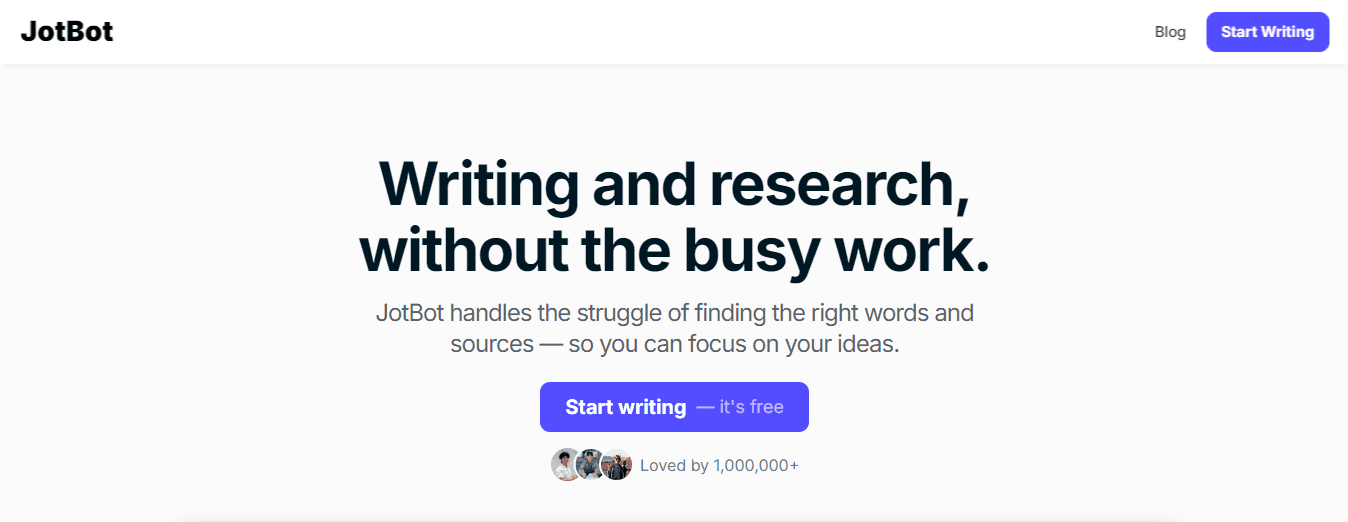
Jotbot AI is transforming how you handle writing tasks. It’s not just an AI note-taker but also an AI video summarizer, citation finder, essay outliner, and complete essay writer. Beyond its impressive capabilities, Jotbot is already trusted by over 500,000 users worldwide. Write more brilliantly, not harder, with Jotbot's AI writing assistant. Start finding sources that are accessible with Jotbot's source finder today. Sign in with Google and get started in seconds.
2. Mendeley: Seamless Reference Management
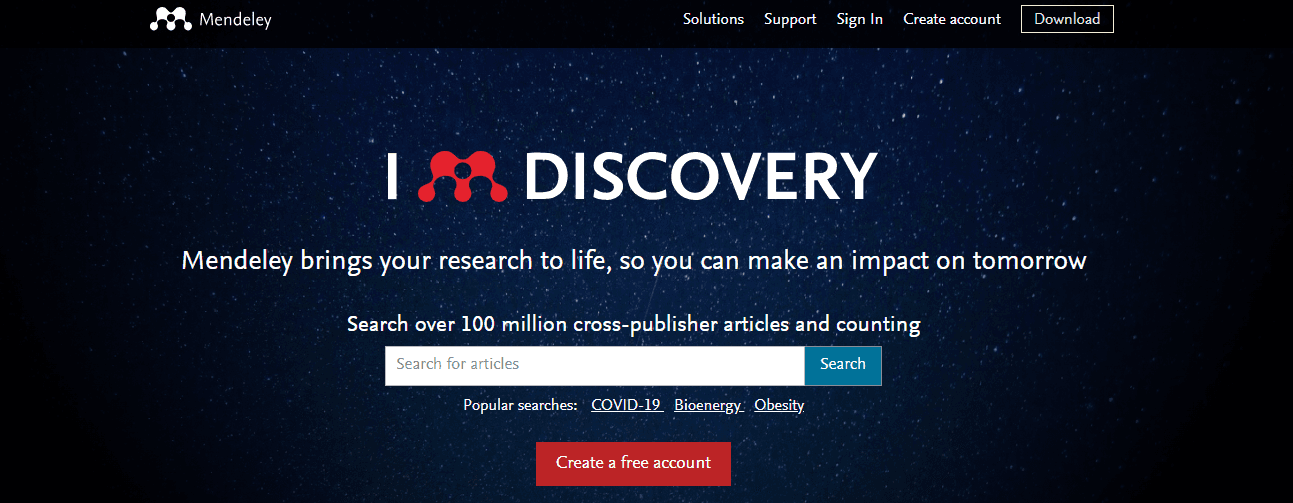
Mendeley offers more than just reference management; it’s also an academic networking platform. Users can annotate PDFs, generate citations automatically, and discover articles that fit their research focus. Its social features enhance collaboration, allowing researchers to connect based on shared interests and publications. Mendeley is essential for building professional relationships and facilitating knowledge exchange.
3. EndNote: Streamlined Bibliography Management
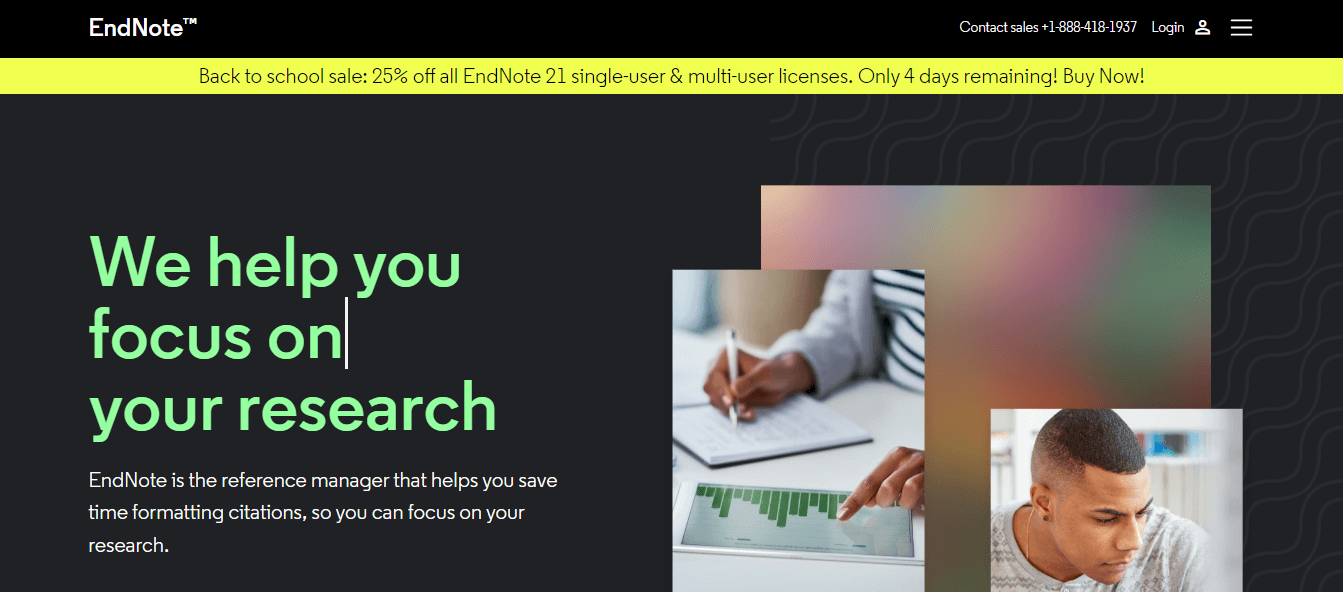
EndNote is a must-have for efficient bibliography and reference management. Advanced search capabilities, customizable manuscript templates, and seamless Word integration significantly reduce the workload of organizing research materials and citations. EndNote is a time-saver, helping researchers enhance submission quality.
4. ResearchGate: Academic Social Networking

ResearchGate is the go-to platform for researchers looking to connect and collaborate. Create profiles to showcase your work, engage in discussion forums, and track the impact of your publications. It’s a valuable tool for staying informed about the latest developments and fostering interdisciplinary cooperation.
5. Scrivener: Organize Long-Form Writing

Scrivener is perfect for managing long-form writing projects. It offers flexible document organization, research management, and outlining tools to keep your work structured and accessible. Scrivener helps researchers maintain focus and coherence, enhancing productivity and content creation.
6. Grammarly: Enhance Writing Quality
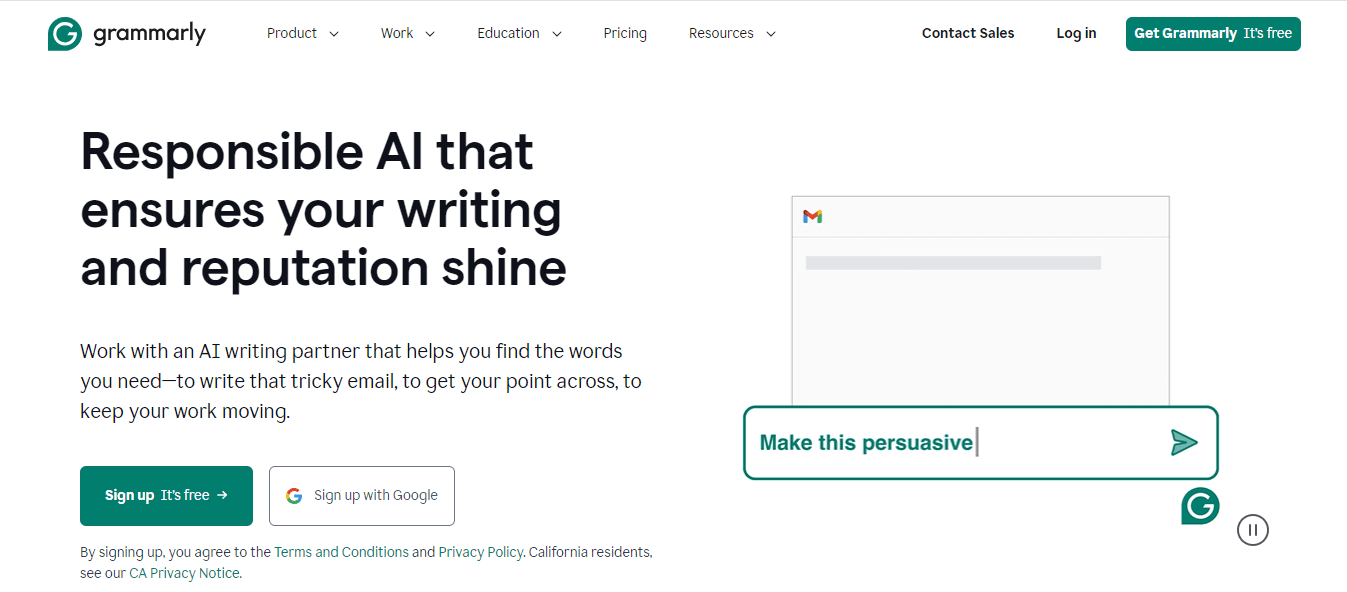
Grammarly is an AI-powered writing assistant that improves clarity, coherence, and professionalism. It provides comprehensive writing suggestions, tone detection, and plagiarism checks. By ensuring grammatical accuracy, Grammarly helps researchers present their findings confidently.
7. IBM Watson Discovery: Advanced Data Analysis
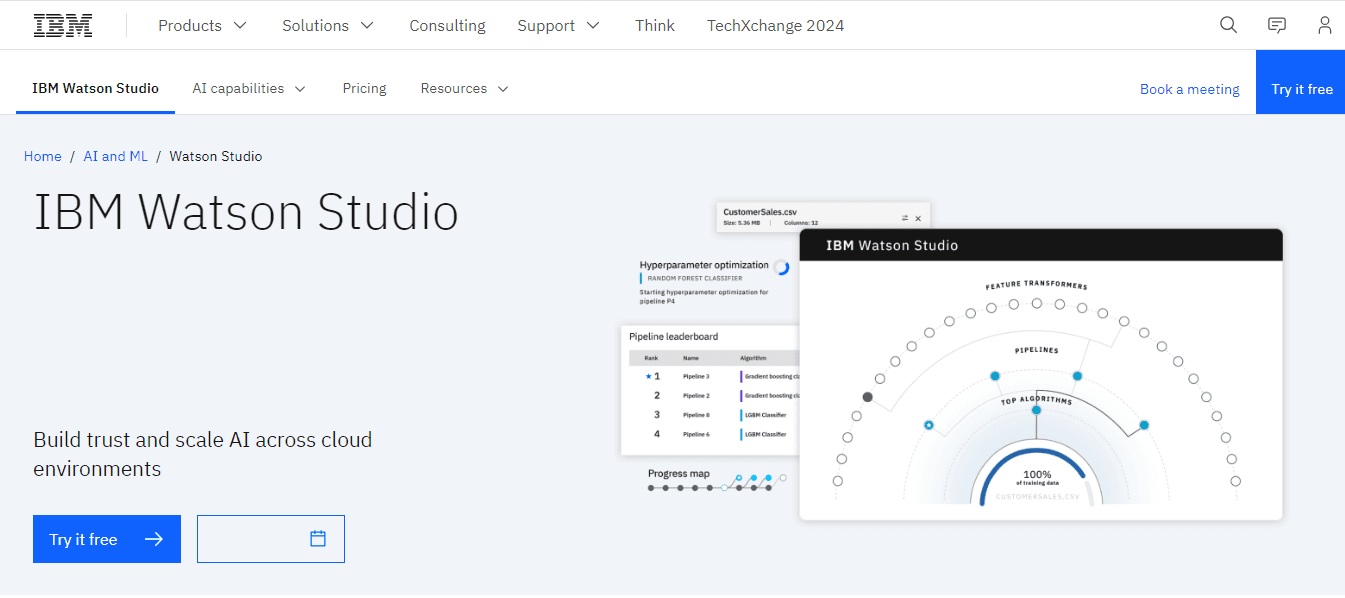
IBM Watson Discovery is ideal for extracting insights from large datasets. Its natural language processing, data visualization tools, and customizable data models accelerate analysis and help researchers present results effectively. This tool is precious for those handling extensive datasets.
8. DeepAI: Simplified AI Integration

DeepAI offers access to pre-trained AI models and tools for image recognition, text generation, and more. Its API access allows for the seamless integration of AI capabilities into research projects, expanding possibilities across various disciplines. DeepAI makes AI accessible without requiring deep technical expertise.
9. Quirkos: Visual Qualitative Data Analysis
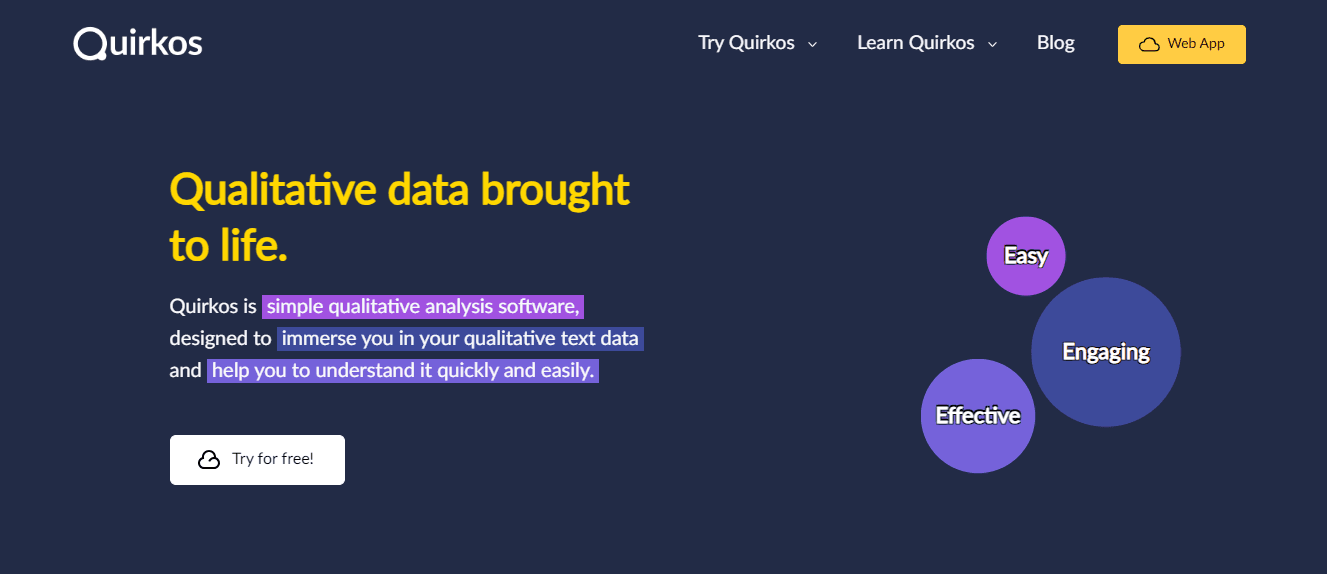
Quirkos simplifies qualitative data analysis with its intuitive visual coding interface. It supports team collaboration and various data import/export formats, making it easy for researchers to identify themes and trends. Quirkos is particularly useful in social sciences and humanities research.
10. Cite This For Me: Effortless Citation Creation
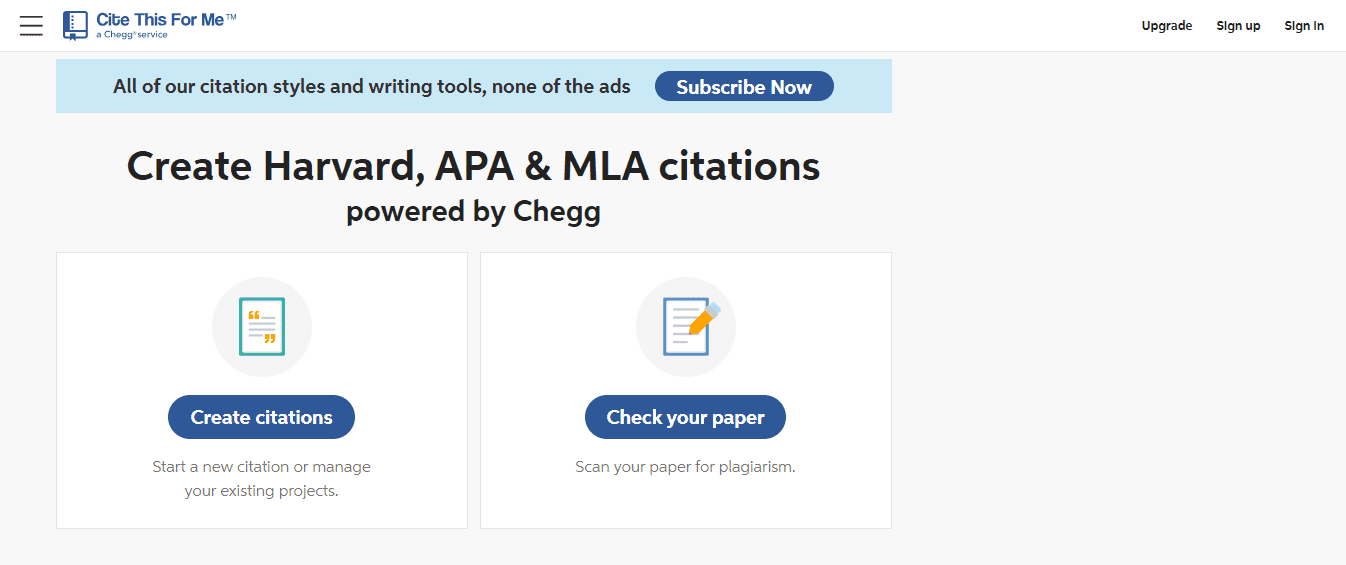
Cite This For Me is an online citation tool streamlines the creation process. It supports multiple styles and integrates with word processors to ensure accuracy and save researchers time. This tool helps maintain proper credit and reduce plagiarism risk.
Start Writing for Free With Jotbot Today!
Jotbot is your personal document assistant and source finder. Jotbot does AI note-taking, AI video summarizing, and AI citation/source finder; it writes AI outlines for essays and even writes entire essays with Jotbot’s AI essay writer.
Join 500,000+ writers, students, teams, and researchers worldwide to write more, write better, and write faster with Jotbot's AI writing assistant. Write more brilliantly, not harder, with Jotbot's AI writing assistant. Start finding sources that are accessible with Jotbot's source finder today. Sign in with Google and get started in seconds.
Benefits of Using AI Research Tools

Supercharge Your Research Efficiency
AI research tools take the grind out of research. Automating mundane tasks like citation management, these tools let you focus on the good stuff—analysis and interpretation. Tools like Zotero and Mendeley handle formatting and organization, so you don’t have to.
Crush Data Analysis with AI
When it comes to data, size matters. AI tools excel at processing large datasets quickly and accurately. Platforms like IBM Watson Discovery and DeepAI use machine learning to find patterns and insights you might miss. This leads to smarter data-driven decisions and sharper hypotheses.
Connect and Collaborate
Research is a team sport. AI tools with collaboration features make networking and working with others easy. Platforms like ResearchGate let you connect with peers, share your findings, and have meaningful discussions. It’s a breeding ground for knowledge sharing and innovation.
Unlock Unlimited Resources
Access to information is power, and AI tools are the gateway. They link you to vast databases, journals, and articles that might otherwise be out of reach. Platforms like Mendeley and Zotero ensure you have all the academic resources you need to back up your research.
Elevate Your Writing Game
Great ideas deserve excellent writing. AI writing assistants like Grammarly help you polish your work, offering real-time style, tone, and grammar feedback. They ensure your writing is clear and impactful so your audience gets the message.
Keep Costs Low
Research doesn’t have to break the bank. Many AI tools offer free or low-cost access to premium features. This democratizes access, allowing everyone, from students to small teams, to use sophisticated tools without significant expenses.
Make It Yours
Every researcher is different. AI tools offer customizable features that fit various research fields and methodologies. Tools like Scrivener let you organize your projects to match your workflow, offering a personalized approach to research management.
Save Time, Do More
AI tools shave hours off your workload by automating parts of the research process. Less time on data entry and citation formatting means more time for experimentation and analysis.
Streamline Your Research
Good research is organized research. AI tools enhance project management by helping you track progress, manage timelines, and collaborate effectively. This keeps your research on schedule and your projects in order.
Support All Research Types
Different research questions require other methods. AI tools accommodate both qualitative and quantitative approaches. For example, Quirkos is tailored for qualitative research, offering intuitive coding and analysis features.
Related Reading
• Best AI Tool For Research
• Reference Finder
• Best AI For Research
• How to Cite AI
• AI For Literature Review
• Websites Like Google Scholar
• AI That Cites Sources
• Best Academic Search Engines
• Academic Research Software
• How To Use Chat GPT For Research
• Best Research Tools For Students
How to Get the Best Results from Your Research Using AI Tools

Define Clear Research Goals
Start with clarity. Know what you want to achieve before diving into AI tools. Are you gathering data, analyzing trends, or writing a report? Clear objectives streamline your process and help you choose the right AI tools.
Choose the Right Tools
Not all AI tools are the same. Look for functionality, usability, and collaboration features that match your research needs. Whether it’s data analysis, citation management, or writing assistance, ensure the tool fits your workflow.
Integrate Tools into Your Workflow
Don't just use AI tools; weave them into your daily routine. From organizing references to drafting your findings, a holistic approach ensures every aspect of your research benefits from AI capabilities.
Utilize Customization Features
Tailor AI tools to your specific needs. Many offer customization options that can enhance your experience. Adjust writing tools like Grammarly settings to match your style or project requirements.
Leverage Automation
Let AI handle the repetitive tasks. Automation features save time and reduce errors. Use citation generators for references or data visualization tools to create charts without manual input.
Collaborate Effectively
AI research tools can enhance teamwork. Share documents, comment on drafts, and co-edit in real time. Collaborating with tools like Mendeley enriches insights and strengthens findings.
Analyze and Interpret Data Wisely
AI tools process vast data, but you must critically evaluate the insights. Use tools like IBM Watson Discovery to spot trends, but always interpret them within your research context.
Keep Learning and Adapting
Stay ahead of the curve. AI is evolving, and you need to keep up. Attend webinars, workshops, and online courses to understand new tools and adapt your strategies accordingly.
Review and Revise Regularly
Research is iterative. Continually review findings, methodologies, and AI tool effectiveness. Be open to revising your approach if specific tools or features don’t meet your expectations.
Seek Feedback and Support
Engage with peers and mentors. Discuss challenges and successes for valuable insights. Use online communities and forums to seek advice and share best practices.
Write more brilliantly, not harder, with Jotbot's AI writing assistant. Start finding sources for free with Jotbot's source finder today. Sign in with Google and get started in seconds.
Challenges and Considerations When Using AI Research Tools

Data Privacy: Protecting Your Most Sensitive Information
Data privacy and security should be at the forefront of mind when using AI research tools. Many AI tools require access to sensitive or proprietary information, so ensure the tools you use comply with data protection regulations and have strong security measures. This will help safeguard your data from potential breaches.
Don’t Get Too Comfortable: The Dangers of Over-Reliance on AI
AI tools can boost research efficiency, but be careful not to lean too heavily on technology. You must still think critically and do manual work to ensure rigorous analysis. Keep a balance between using AI and exercising your judgment and expertise to avoid pitfalls.
Review and Refine: Ensuring Quality of AI-Generated Content
AI writing tools can be helpful for drafting and editing, but the quality of AI-generated content can vary. Continually review and refine AI-generated outputs to ensure accuracy and clarity. Blindly relying on AI for writing or analysis can lead to misleading conclusions or poorly constructed arguments.
Steep Learning Curve: Navigating Advanced AI Tools
Many advanced AI tools have a steep learning curve. You may need training or time to understand and fully utilize their features. Investing time learning the tools' intricacies is crucial to maximizing their benefits.
Integration Challenges: Incorporating AI Into Your Workflow
Integrating new AI tools with existing research systems or workflows can be challenging. You may face compatibility issues or difficulty incorporating AI tools into your established processes. Careful planning and testing are essential to ensure a seamless integration.
Budgeting for AI: Weighing Costs Against Benefits
While many AI research tools offer free versions, advanced features often come at a cost. Consider your budget when selecting tools, particularly for large-scale projects or institutional use. Weighing the cost against the expected benefits is critical for making informed decisions.
Contextual Understanding: The Limits of AI Analysis
AI tools often analyze data based on algorithms and patterns, which may need more contextual understanding. Be aware that AI may need to grasp the nuances of specific research topics, potentially leading to oversimplified conclusions. Human interpretation remains essential for providing depth and insight.
Ethical Implications: Balancing Authorship, Originality, and Bias
The use of AI in research raises ethical considerations, particularly regarding authorship, originality, and bias. Reflect on the moral implications of using AI tools and strive to use them responsibly. This includes being transparent about using AI in your work and addressing any biases arising from algorithmic decision-making.
Staying Current: Keeping Up with Rapid Changes in AI
The landscape of AI technology is constantly evolving. New tools and updates are released frequently, making it challenging to stay current. Regularly exploring new resources and participating in professional development can help you adapt to ongoing changes in AI research tools.
Collaboration Challenges: Ensuring Consistency in Research Quality
While AI tools can facilitate collaboration, they may also introduce challenges. Different team members may have varying proficiency levels with AI tools, leading to consistency in research quality. Establishing clear guidelines and training can help ensure all team members are on the same page.
Write Smarter With Jotbot's Source Finder — Start Writing for Free Today
Have you ever found yourself drowning in a sea of sources, unsure where to start? Meet Jotbot, your personal document assistant and source finder. This AI-powered tool helps you tackle the overwhelming task of research with ease.
Whether you're a student, writer, or researcher, Jotbot's got your back with AI note-taking, video summarizing, and citation/source finding; you can focus on what matters. And remember the AI essay writer who can write a draft quickly. Why struggle when you can write more brilliantly, not harder? Give Jotbot a try today, sign in with Google, and get started in seconds.
Related Reading
• Elicit AI
• Scisummary
• Scholarcy AI
• Sourcely
• Consensus AI Tool
• Mendeley Alternatives
• Cite This For Me Alternative
• Scholarly Sources Examples
• Academic Sources Examples
• How to Find Scholarly Sources
• List of Scholarly Sources
• Examples of Peer Reviewed Sources
• How to Cite a Book
• How to Cite an Article
• How to Cite
• How to Cite a PDF
• How to Cite Multiple Authors MLA
• How to Cite a Website in Text
• How to Cite a Lecture
• How to Cite ChatGPT
Write more, better, faster.
Your personal AI document assistant












